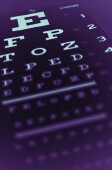
More research needed to assess benefits and harms of screening for impaired visual acuity in older adults
TUESDAY, July 21, 2015 (HealthDay News) — The U.S. Preventive Services Task Force (USPSTF) has concluded that there is currently insufficient evidence to assess the benefits and harms of screening for impaired visual acuity in older adults. These findings form the basis of a draft recommendation statement based on an evidence review published online July 20 by the USPSTF.
In an effort to update the 2009 statement, researchers from the USPSTF conducted a systematic review of the recent evidence on screening for visual acuity impairment in adults aged 65 years or older in the primary care setting. The investigators examined the benefits and harms of screening, accuracy of screening, and benefits and harms of early vision impairment treatment.
The researchers found that there was inadequate evidence on the benefits of screening, early detection, and treatment to fully examine the overall benefits. Inadequate evidence was also found on the harms of screening. Overall, the evidence was insufficient to assess the balance of benefits and harms for visual impairment screening (I statement). These findings form the basis of a draft recommendation statement, which is available for comment from July 21 to August 17.
“We need more evidence on accurate ways to screen for eye conditions in older adults in a primary care setting and on the link between vision screening and quality of life,” Al Siu, M.D., M.S.P.H., chair of the USPSTF, said in a statement.
Evidence Review
Draft Recommendation Statement
Comment on Recommendation
Copyright © 2015 HealthDay. All rights reserved.







